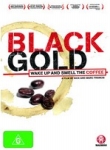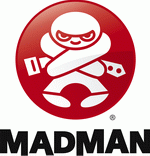Black Gold (2006) |
|
Black Gold (2006) |
|


|
| BUY IT |
| General | Extras | ||
| Category | Documentary |
Interviews-Crew-Al Jazeera Picture Show Q&A (17.50) Interviews-Cast-Director Q&A with Jon Snow (14.28) Interviews-Cast-Message from Tadesse: What You Can Do? (1.53) Theatrical Trailer-(1.48) |
|
| Rating |

|
||
| Year Of Production | 2006 | ||
| Running Time | 78:00 | ||
| RSDL / Flipper | No/No | Cast & Crew | |
| Start Up | Menu | ||
| Region Coding | 4 | Directed By |
Marc Francis Nick Francis Sally Jo Fifer Cathy R. Fischer |
|
Studio
Distributor |
 Madman Entertainment |
Starring | None Given |
| Case | Amaray-Transparent | ||
| RPI | $29.95 | Music |
Kunja Chatterton Matt Coldrick Andreas Kapsalis |
| Video | Audio | ||
| Pan & Scan/Full Frame | None | English Dolby Digital 2.0 (192Kb/s) | |
| Widescreen Aspect Ratio | 1.78:1 | ||
| 16x9 Enhancement |
 |
||
| Video Format | 576i (PAL) | ||
| Original Aspect Ratio | 1.78:1 | Miscellaneous | |
| Jacket Pictures | No | ||
| Subtitles | English (Burned In) | Smoking | No |
| Annoying Product Placement | No | ||
| Action In or After Credits | No | ||
The Black Gold in the title of this documentary is not oil, Texas Tea, as you might expect, but coffee. There's a sting in that minor confusion. After oil, coffee is the most traded commodity on the global market. But unlike the oil producers of the world, who live in the cradle of wealth, the coffee grower, that first link in the chain to your double latte, is often paid a pittance for his product.
Black Gold brings to light some of those inequities and the damage that is occurring in the coffee growing regions of the world. Rather than look at the industry as a whole Black Gold focuses on one pocket of the market - the coffee growing region of Oramia in Ethiopia. Said to be the birthplace of coffee, and a producer of some of the worlds finest coffee, the region is notable for the poverty of the inhabitant including the coffee farmers.
Filmmaking brothers Marc and Nick Francis make a plea for equality and fairness in the treatment of the farmers. Genuine and subtle filmmakers, they refuse to use cheap sentiment or bombastic argument to sell their story. Although the tale necessitates understanding the world commodities market, particularly the New York Stock Exchange, this lesson is only a small part of the film. Instead they look at the small and let the story tell itself. As the face of Ethiopian coffee they struck their own form of gold in finding Tadesse Meskela, the representative of a co-operative of some 74,000 growers. The film follows Tadesse from meetings with the poor farmers, debating whether to keep their meagre profit or build a school in the village, to the coffee centres of the world and the shops where Tadesse tries to find his coffee on shelves packed with mass market product. Tadesse is a believer and a persuasive arguer for fair trade, but he refuses to become depressed or embittered by the difficulty of the struggle. In one heartbreaking scene we follow him to a world coffee specialists expo - this representative of some of the worlds finest coffee beans - only to see him selling his wares at a booth not much bigger than a lectern. Only then does it really hit home how little power the grower has in the process of distribution of coffee.
So fair minded is this film that for much of it the viewer doesn't know who the villain is in the piece. Is it the multinationals screwing the farmers down on price or the middlemen taking a slice of the dollar? Or is it us, the consumer, wolfing down our morning buzz without sparing a thought for the far-flung plantations and the toil that goes into delivering this product? As it turns out the whole process is to blame, but it is fixable. How? Well market understanding is the first step. Buy Free Trade coffee wherever possible and pressure the local coffee shop to purchase the product. The big hitters in the industry refused to be interviewed and a scene with a Starbucks manager spouting the virtues of their product is perhaps the only Michael Moore-ish moment in the film.
Black Gold does not purport to have all the answers. But it does open the questions up for debate. The lasting image is of ships arriving with aid for the starving when a fairer coffee price would achieve the aim much more economically. The unfortunate reality is that it is much easier politically for politicians to send a load of aid to Africa than decrease domestic subsidies and risk the wrath of their own farmers.
Black Gold was shot on hi-definition digital video and projected cinematically at a 1.85:1 aspect ratio.
That ratio has been preserved for the DVD release. It is 16x9 enhanced.
There is some striking imagery in this film -particularly the picturesque Ethiopian hillsides. The film is good looking considering the low budget origins. The colours are stable and the image quality is crisp. The flesh tones are accurate.
It does suffer from some digital noise and this is not the type of film to show off a home theatre system. Compression is not a problem despite the fact that the film and extras are put on a single layer DVD.
There are subtitles in English burned into the print for the non-English sections and also for the English sections where the words spoken are difficult to understand.
| Sharpness | |
| Shadow Detail | |
| Colour | |
| Grain/Pixelization | |
| Film-To-Video Artefacts | |
| Film Artefacts | |
| Overall |
The sound for Black Gold is English Dolby Digital 2.0 running at 192 Kb/s.
Despite the very low bit-rate there are no problems with the soundtrack to this film. The voices can be heard clearly and, as said above, where there are comments in English that are difficult to understand the filmmakers have chosen to subtitle them. Tadesse speaks English although he can be a little bit difficult to understand when he gets passionate about the subject.
The music is by Andrew Kapsalis and combines echoes of the coffee growing regions in an absorbing soundscape.
Audio sync is fine.
| Dialogue | |
| Audio Sync | |
| Clicks/Pops/Dropouts | |
| Surround Channel Use | |
| Subwoofer | |
| Overall |
This is a lengthy Q&A from the English Al Jazeera network with the filmmakers. They are remarkably candid about their film and accept the difficulties and issues that lie at the bottom of solving such a complex problem.
Another Q&A, although this is probably more of an interview by Snow. As he points out the tragedy of coffee is that the film could have been made in any of the world's coffee growing regions. The Francis brothers are asked whether they have unfairly picked on Starbucks because it is the biggest. Their fair response is that the giant chain claims to support Fair Trade coffee yet has only 3.7% of its coffee supplied in this fashion (according to the Starbucks website that is now 6%).
In a couple of minutes Tadesse makes is personal plea, setting out what we can do as consumers to alleviate the problem.
NOTE: To view non-R4 releases, your equipment needs to be multi-zone compatible and usually also NTSC compatible.
This DVD is marked Region 4. According to the www.blackgoldmovie.com website version that can be purchased there and in Region 1 contains the same extras and (except for more language options) also has : Live at Sundance / The Making of the Soundtrack and Tadesse - The Latest.
These would be useful extras however the website for the film also functions as an update on the progress of Tadesse and his growers.
Black Gold is a fascinating documentary that does exactly what it sets out to do - make you think next time you drain a macchiato at your local coffee shop.
The film has a decent enough DVD transfer and a useful selection of extras to sell the package.
| Video | |
| Audio | |
| Extras | |
| Plot | |
| Overall |
| Review Equipment | |
| DVD | Pioneer BDP-LX70A Blu-ray Player, using HDMI output |
| Display | Pioneer PDP-5000EX. This display device has not been calibrated. This display device is 16x9 capable. This display device has a maximum native resolution of 1080p. |
| Audio Decoder | Built in to amplifier/receiver. Calibrated with Ultimate DVD Platinum. |
| Amplification | Onkyo TX-SR605 |
| Speakers | JBL 5.1 Surround and Subwoofer |